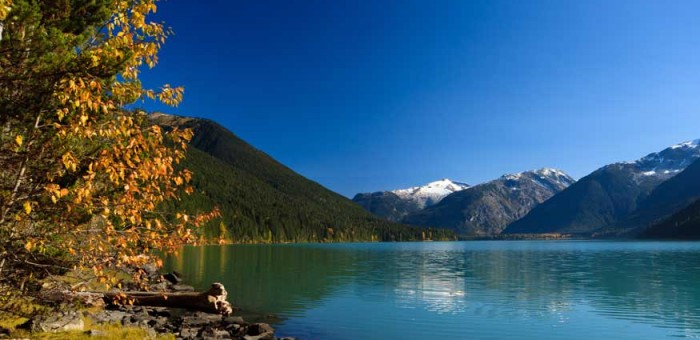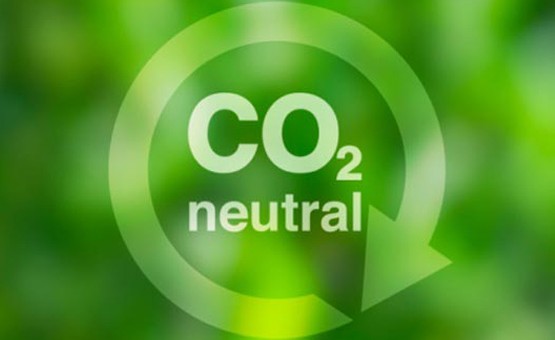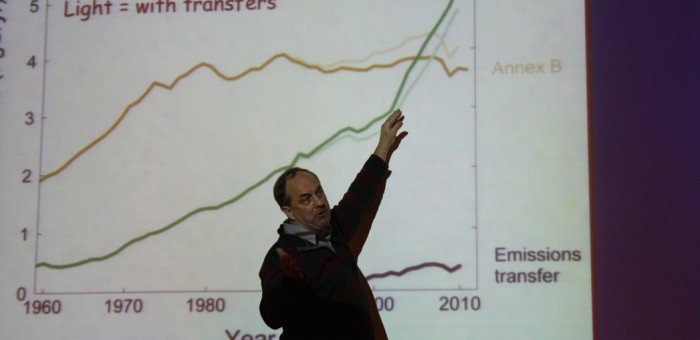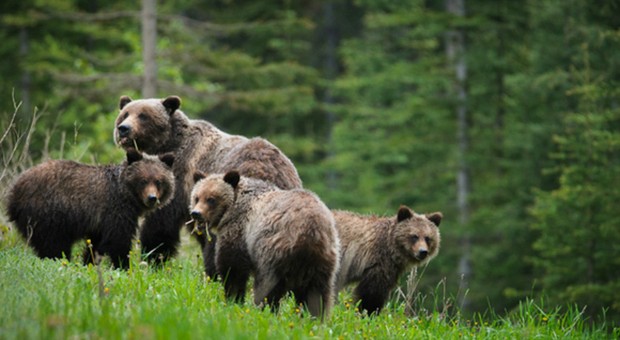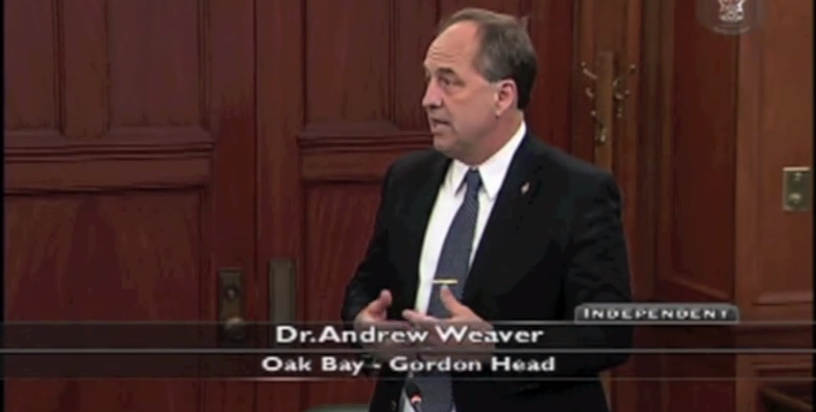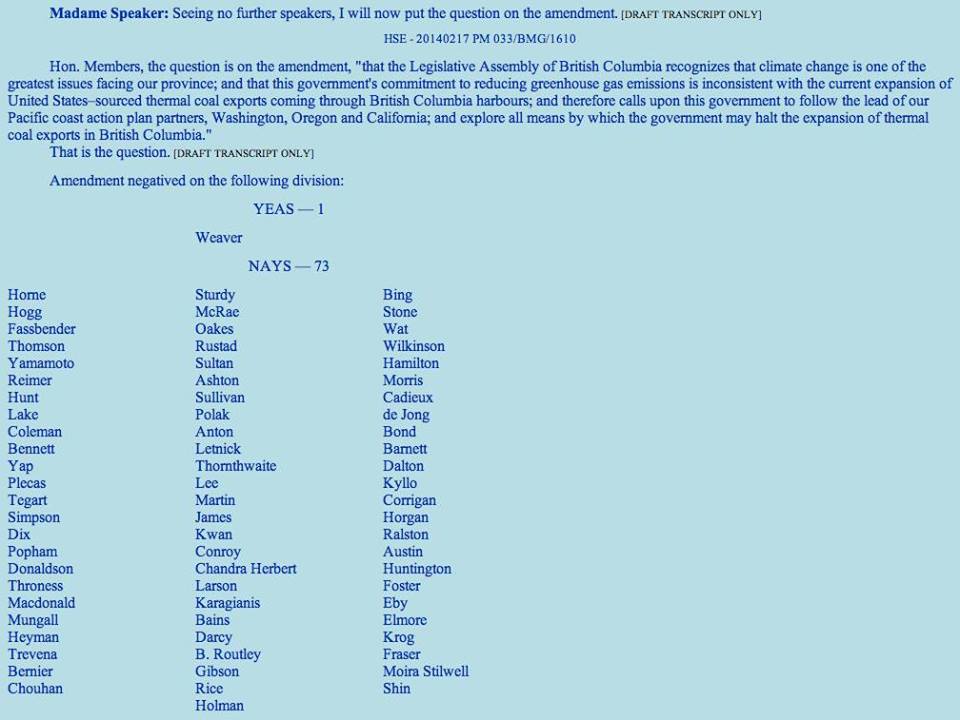Environment
Opposing Bill 4 – Public Trust Needed for Parks Act
Earlier this session the government introduced Bill 4 – the Park Amendment Act. This act essentially allows the government to issue park permits for two activities that are unrelated to the mandate and purpose of our parks. The first is that park-use permits can now be issued for film production. Generally I support this development, and think that it could provide a boost to our film industry. The second is that park-use permits can now be issued for “research” activities.
Prior to this legislation, park-use permits could not be issued unless, in the opinion of the minster, they were necessary for the preservation or maintenance of the recreational values of the park. This Bill now allows park-use permits for film production and for ‘research’.
Research can mean different things to different people. Research can mean a study on an endangered species, or it can mean exploratory drilling. Some types of research seem appropriate for our parks and fall within the purpose and mandate of our parks, others do not. Leaving out a definition of research without any parameters around what will and will not be allowed under a ‘feasibility study’ is leaving our parks open to possible industrial development in the future.
Current regulations and policy does define and constrain research activities that will be undertaken in our parks. However, regulations and policy can change without any public input and without public announcement. Legislation, on the other hand, is openly debated in parliament.
There is a lack of public trust on this issue. There is a lack of public trust that government has the best interests of our parks in mind, particularly given the strong opposition to pipelines going through our province. Instead of unilaterally weakening the laws that protect our Parks, the government should instead undertake an extensive public consultation in order to obtain the social license that is critical for this type of change to the Parks Act.
Today in the house I stated that:
“Public trust is a key component of why I am opposing this Bill. The public does not know why this Bill is being brought forward, and does not necessarily trust government to ensure that this Bill will not undermine our parks. Although the policies and regulations around the issuance of research permits do have specific constraints, these policies can be easily changed without going through the legislature. Today the public is concerned about pipelines and large industrial projects going through our province, and it is not surprising, therefore, that this legislation which weakens the requirements for the issuance park permits, has faced considerable backlash. Indeed, of the legislation introduced thus far this session, this Bill has gained the most significant and controversial media attention that I have seen in quite some time.”
I also stated that “Our parks are world-renowned and are a huge part of our tourism industry, they are enjoyed by thousands of British Columbians every year, and in many ways, represent the best that “Beautiful British Columbia” has to offer. This legislation weakens the current legislation of the Parks Act, and there are many who fear that it paves the way for industrial projects through our parks.”
Understanding the concerns around this Bill my staff and I were prepared to call for an amendment to delay the enactment of the Bill, allowing for public engagement and clarification of the Act. However, before I spoke to the Bill the official opposition, sharing many of my concerns, introduced an amendment calling for a delay of 6 months on the enactment of Bill 4. This is a move I fully support.
My Views towards the Bill in Full
The Park Amendment Act, introduced earlier this session, has some elements to it that I believe warrant support. In particular I was happy to see the inclusion of a more streamlined and accessible park permit issue process for activities related to film production. This legislation will likely attract additional filming business to the province, and I applaud the government for its foresight in including film production components in this Bill.
However, I have considerable concerns around how the concept of “research” is being proposed in this Bill. Good research is an integral part of forming good policy and I am a firm believer in the principle of evidenced-based decision making. The problem with how this legislation uses the term ‘research’ is that it does not define the term, it does not give any limiting parameters around what types of research would or would not be allowed, and it provides no guidelines on how the research activity is to be conducted. I am aware that there is a definition for research as well as guidelines around how research permits can be issued within the parks policy, but herein lies the problem. Policy and regulations can be changed and modified without public input or awareness, in contrast, modifying legislation has a clear accountability process.
The reason why we have parks in this province is to preserve and protect the most outstanding natural environments and ecologically diverse areas of British Columbia. Our parks exist for the use and enjoyment of British Columbians today and for the future generations of tomorrow. Indeed, the mission of BC parks is to “protect representative and special natural places within the provinces Protected Areas System for world class conservation, outdoor recreation, and education.” Furthermore, in its mandate BC Parks outlines its commitment to British Columbians through:
- protecting and managing for future generations a wide variety of outstanding park lands which represent the best natural features and diverse wilderness environments of the province.
- providing province-wide opportunities for a diversity of high quality and safe outdoor recreation that is compatible with protecting the natural environment.
- Maintaining British Columbia’s ecological diversity through the preservation of representative, and special natural ecosystems, plant and animal species, features and phenomena.
Operating on this understanding of the purpose of our parks, this Bill fails to define research in a way that ensures that the mandate and underlying purpose of why our Parks exist, is not undermined. One definition of research that I would argue is compatible with the mandate of our parks is one used by the Organization for Economic Cooperation and Development. This organization defines research as “experimental or theoretical work undertaken primarily to acquire new knowledge of the underlying foundations of phenomena and observable facts, without any particular application or use in view.”[1] I would like to draw attention to that last section of this definition and highlight that research in this sense is done, and I quote, “without any particular application or use in view”. Being a scientist by trade, I believe this definition encompasses the spirit of what good research in our Parks should entail.
For example, research that is focused on understanding the endangered Vancouver Island Marmot within the Haley Lake Ecological Reserve is, in my opinion, entirely acceptable as the underlying motivation of the research is to acquire new knowledge of this species. This type of research is also directly compatible with the mandate and purpose of our Parks. In comparison, exploratory drilling ‘research’ or widespread ore-sampling ‘research’ in the same type of protected area is not acceptable, as the motivation behind this type of research is likely for an industrial project which would directly contradict the mandate and purpose of our Parks. In my view, this latter type of research that supports a specific application or project within our parks, and which also inherently works against the purpose and mandate of our Parks, is problematic to say the least.
The proposed legislation will overrule previous clauses of the Park Act which ensure park use permits are not be granted unless it is clear that the permits “will not be detrimental to the recreational value of the park”. Current legislation also states that permits “must not be issued unless, in the opinion of the minister, it is necessary for the preservation or maintenance of the recreational values of the park involved”. By allowing park use permits to be issued around this vague concept of ‘research’, particularly research focused on undertaking a “feasibility study” for virtually any type of “prescribed project”, we are opening our Parks to special interests whose intentions may not align with the interests of British Columbians. It seems to me that this legislation is, intentionally or not, prioritizing industrial proposals over the preservation and protection of the parks of British Columbia. Given that we are discussing protected crown lands meant to preserve and protect places of ecological sensitivity, the habitats of endangered species, or places of historical and natural significance, should there not at least be some basic guidelines imbedded in the legislation around what type of research can be conducted and how it must take place?
Public trust is a key component of why I am opposing this Bill. The public does not know why this Bill is being brought forward, and does not necessarily trust government to ensure that this Bill will not undermine our parks. Although the policies and regulations around the issuance of research permits do have specific constraints, these policies can be easily changed without going through the legislature. Today the public is concerned about pipelines and large industrial projects going through our province, and it is not surprising, therefore, that this legislation which weakens the requirements for the issuance park permits, has faced considerable backlash. Indeed, of the legislation introduced thus far this session, this Bill has gained the most significant and controversial media attention. Six of the leading environmental organizations that are active in this province and which have memberships representing many tens of thousands of British Columbians, have condemned this Bill. Good governance requires outreach and consultation on controversial topics and I encourage the government to actively engage the citizens of British Columbia in public forums before enacting Bill 4
Our parks are world-renowned and are a huge part of our tourism industry, they are enjoyed by thousands of British Columbians every year, and in many ways, represent the best that “Beautiful British Columbia” has to offer. This legislation weakens the current legislation of the Parks Act, and there are many who fear that it paves the way for industrial projects through our parks.
As the Bill does not define the term research, and does not outline what constitutes a valid research activity within the protected areas of British Columbia, I cannot support this Bill. Before this legislation is passed I ask the government to explicitly define the term research, to produce research guidelines that would ensure any research activity done within our Parks would follow specific rules, and to amend the definition of a “feasibility study” to contain specific limitations and parameters which would ensure that these feasibility studies are compatible with the mandate of our Parks. Furthermore, as this research will take place on public lands, I believe that the Bill should clarify that any research activity which receives a park-use permit must be done in a manner that is consistent with the long-term health and purpose of the park. I ask that all of these requests be enshrined within legislation.
I think that in BC right now, there is a general lack of public trust at this juncture for changes to the way parks are administered, particularly with the uncertainty around major pipeline projects. Despite some positive aspects to the legislation, the fact that the public does not trust the reasons why government is making amendments to the Park Act is a serious concern.
I question whether the government has obtained the necessary social licence to make changes that could contribute to streamlining the development of industrial projects in our parks – projects which in some cases, a majority of British Columbians are opposed to.
I am opposed to the nature and direction that this legislation currently takes, and I urge the government to carefully consider the long-term consequences of passing this bill as it stands today.
Expansion of Carbon Neutral Capital Program Welcome News
Media Statement: March 4th, 2014
Expansion of Carbon Neutral Capital Program Welcome News
For Immediate Release
Victoria BC – Andrew Weaver, MLA for Oak Bay-Gordon Head, is welcoming the expansion of the Carbon Neutral Capital Program announced by The Honourbale Mary Polak, Minister of Environment today. Currently the program provides $5 million annually to school districts for improvements and upgrades to buildings and services for energy efficiency and reduced greenhouse gas emissions. The extension will provide an extra $9.5 million for post-secondary institutions and health authorities.
“What is critical is that this leaves in place the Carbon Neutral Government legislation requiring the public sector to show leadership in emissions reductions. I support the expansion of the capital program to hospitals, universities and colleges. In a media release last November I also called for the government to go further to develop an offset program and provide capital funds for the conversion of school bus fleets and BC Ferries to run on compressed or liquefied natural gas. While this is good news, I remain concerned the expansion of hydraulic fracking and proposals for LNG export plants will put our legislated greenhouse gas reduction targets in jeopardy” said Andew Weaver
Media Contact
Mat Wright – Press Secretary, Andrew Weaver MLA
mat.wright@leg.bc.ca
1 250 216 3382
What the Provincial Government can do to Impede Thermal Coal Exports
Thermal coal is being increasingly shipped out of BC ports. The vast majority of this thermal coal originates in mines outside of our province: primarily in the Powder River Basin in the US and from a few mines in Alberta. American mining companies such as Cloud Peak Energy, Arch Coal, and Peabody Energy, are attempting to get their product to Asian markets and are desperate to do so as US power plants have increasingly displaced coal with natural gas. Facing stiff opposition from increasing coal exports through Washington, Oregon, and California, these companies have shifted their attention to BC.
The shipping of this thermal coal is completely inconsistent with BC’s climate strategy and yet the provincial government has done nothing to impede it. In fact it seems like the opposite is true, BC, it appears, is open for business.
While it is true that the operation of Port Authorities (and any expansions) falls under federal jurisdiction there are significant opportunities for the province to step in and take an active role in opposing the expansion of thermal coal exports.
The most controversial coal expansion project is currently the Fraser Surrey Docks Terminal Expansion. Using this example, the province could undertake a number of initiatives:
- Texada Quarries has applied for a permit amendment to increase their Coal Storage limit and this is a key link in the Fraser Surrey Docks proposal. The permit amendment process runs through the ministry of Energy and Mines. Under both the Mine Act and the Environment Management Act this permit could be refused because of concerns around Health and Environmental Impacts. As part of its permitting process the province could also call for a Health Impact Assessment and Environmental Impact Assessment as a prior condition to granting the amendment.
- The Minister of Health could order a Health Impact Assessment being called for by both the Local Medical Health Officers and the Provincial Health Officer with the Fraser Surry Docks Terminal Expansion.
- The Ministry of Environment could also order its own comprehensive Environmental Impact Assessment, as opposed to the one that was commissioned by FSD that has received heavy criticism.
Clearly the province has powers that could delay, impede and derail this specific expansion. For a province that claims to be a leader in climate change action, the expansion of thermal coal exports through our ports is deeply hypocritical. Significant opposition around this project exists. Municipal councils, health officials, school boards, environmental groups and concerned citizens have all voiced their opposition to a project that does little to benefit our province yet showcases the hypocrisy of the BC Liberal position on climate change.
In comparison, our southern neighbors take climate change seriously when considering new projects. For example, in Washington, as part of its Environmental Assessment (EA) for the Gateway Pacific Coal Port project, the Department of Ecology is actively considering the impacts climate change in its assessment. The EA includes an analysis of greenhouse gas emissions associated with the project site and construction, transportation from mine to market, and the end-use burning of exported coal in Asia!
The government claims that jumping head-first into the race on LNG is the single best thing that the province can do to address climate change. I frankly think that actively opposing the expansion of the dirtiest fuel on the planet would do a lot more.
Grizzlies in the Great Bear Rainforest
I posed a question to the Minister of Forests, Lands and Natural Resource Operations today asking how many Grizzly Bears he believes reside in the Great Bear Rainforest. I further asked the Minister if his government supports an immediate moratorium to trophy killing in the Great Bear Rainforest. Below is the excerpt from Hansard. His response will not give heart to those who are working so diligently to protect this iconic species.
TROPHY KILLING AND POPULATION STATUS OF GRIZZLY BEARS
A. Weaver: I just wish to change topic for a second and give the Minister of Finance a break. My question is posed to the Minister of Forests, Lands and Natural Resource Operations.
British Columbia is blessed to be home of the world’s largest pristine coastal temperate forest, the Great Bear rainforest. Tourists flock there every year from around the world to watch grizzly bears in their natural habitat.
Unfortunately, this iconic species is also subject to trophy killing. Twice a year a few wealthy foreigners, predominantly from the U.S., fly into the forest to shoot bears, cut off their heads and leave the bodies to rot. This so-called sport has been banned by nine coastal First Nations and is opposed by nearly 90 percent of British Columbians and, importantly, 95 percent of hunters.
Can the Minister of Forests, Lands and Natural Resource Operations please tell the House precisely how many grizzly bears there are left in the Great Bear rainforest?
Hon. S. Thomson: I acknowledge that the member opposite comes from a different place on this particular issue than we do on this side of the House. Our approach to wildlife management, to hunting in British Columbia, is based on a long history of best available science, based on an approach that hunting is an important part of population management and conservation in British Columbia.
The decisions are based on best available science, are based on conservative estimates of human mortality, are based on conservative estimates — deliberately conservative estimates — of regular mortality for species. That’s not just for grizzly bears. That’s for all species in the province.
Madame Speaker, 58 percent of the territory of the coastal First Nations is closed to grizzly bear hunting. There are about 2,000 bears in the Great Bear rainforest, of which less than 1 percent, 13, are hunted.
Madame Speaker: Member for Oak Bay–Gordon Head on a supplemental.
A. Weaver: I would argue, as clearly indicated, that we actually have no idea how many grizzly bears there are in the Great Bear rainforest, let alone elsewhere in British Columbia. Fortunately, however, in the case of the former, a coalition of nine First Nations, scientists and environmental groups have been undertaking fieldwork on bear populations, breeding habits and the impacts of trophy killing.
Here’s what we do know. In the Great Bear rainforest bear viewing generates 12 times more in visitor spending than bear killing — over 11 times the direct revenue for British Columbia’s provincial government. Bear viewing also generates 50 times the number of jobs as trophy killing. And forest companies and environmental groups have reached a historic agreement on the preservation of the Great Bear rainforest.
In light of the evidence I’ve provided, would the government support an immediate moratorium on trophy killing of grizzly bears in the Great Bear rainforest?
Hon. S. Thomson: Firstly, I want to acknowledge the member opposite’s reference to the agreement that’s been reached between environmental organizations and the forest industry in the Great Bear rainforest. I think that’s something that we can all celebrate — that very, very important step. We look forward to continuing to work with both the industry, those organizations and First Nations in the implementation of that very, very historic, important agreement.
I think the important point to make here is that this is not about either-or. This is about the important contribution that bear viewing and tourism make. It’s also about the important contribution that hunting makes to this province — $360 million annually.
This is not about one or the other. This is about making sure that we manage populations based on science, as I pointed out, based on conservation principles, to ensure that we create that appropriate balance, and that’s what we’ll continue to do.
In our population units for grizzly bears, wherever those populations are at risk, we don’t allow hunting. That’s the case in many of the population units in British Columbia currently. If the populations are at risk, we will not allow hunting in those population units.
Putting Climate Targets Back Into the Throne Speech
On the floor of the House Andrew Weaver spoke to his motion to amend the Throne Speech, highlighting the government’s inconsistency in greenhouse gas targets. Under the province’s climate targets the legislated goal is to reduce emissions from the current 62 megatons of carbon pollution to 43 megatons by 2020 and 13 megatons by 2050. Producing liquefied natural gas through five plants would add 73 megatons to current provincial emissions, making our greenhouse gas targets impossible to keep.
The government has stated LNG exports from BC will reduce Asian, especially China’s, dependency on coal fired power generation, therefore reducing their carbon emissions. If we are serious about reducing global emissions then a better plan would be to halt exports of thermal coal through BC. Doing so would have little impact on provincial employment, or revenue, as the vast majority is produced from US mines.
Transcript: Speech from the floor of the House
“With the 2014 Speech from the Throne the British Columbia Government has once again conveyed its goal of creating jobs, controlling spending and building an economy that is not erected on the backs of future generations.
Like the government, I too believe this is possible. In fact, I believe that the long-term economic prosperity of BC will ultimately depend on us meeting this goal. It will depend on our ability to transition our economy to one that meets the needs of today without sacrificing the welfare of future generations.
However, with this belief comes my assertion that we are not yet there — that there is more to be done — a lot more to be done. We need a vision coupled to a concrete plan of action to get us there.
In 2008, we had such a vision for this economy. It manifested itself alongside the Climate Action Plan and with its inception, we as a province set out on a new path. We — British Columbians — led not only our country, but our continent as we found innovative ways to begin the transition to a strong, low-carbon economy.
In 2008 we had a plan to transition ourselves to this economy—one that was grounded in evidence and accountable to clear, measurable targets. The goal was to decrease greenhouse gas emissions by 33% below 2007 levels by 2020. We were on track to achieve this goal. However, under the vision of the current throne speech, I am afraid to say, we will certainly fail.
When I respond to the Budget, I will elaborate on this concern.
Today, however, I would like to focus on the government’s bold assertion that LNG development is “the greatest single step we can take to fight climate change.”
According to the Throne Speech, LNG production could reduce China’s emissions by over 90 megatons per year. Leaving aside the fact that no credible international climate body would offer greenhouse gas reduction credits to a jurisdiction for producing greenhouse gases, let’s still look at the overall numbers.
In 2011 BC emitted 62 megatons of carbon pollution. Our legislated goal is to reduce our provincial emissions to 43 megatons by 2020 and to 13 megatons by 2050.
If LNG is to decrease China’s emissions by 90 megatons per year, we will have to produce it. What this means is that while China could decrease its emissions, we will certainly increase ours. The question is: How much will our own emissions increase and how will this affect our own, provincially legislated climate targets?
According to the Pembina Institute, if we are to meet the government’s revenue projections from LNG, we would need at least 5 LNG plants. These plants would emit roughly 73 megatons of carbon pollution each year. That is nearly double our 2020 target and more than 5 times our 2050 target.
What does this all mean? Selling LNG to China so that it might decrease its carbon emissions means that we in BC will have no choice but to throw our own targets out the window. Forget the laws. Forget the rhetoric. The science says it’s impossible. We will be throwing away the certainty of our own climate targets for the possibility of theirs.
If we are to walk away from leadership—if we are to turn our backs on our climate targets and ignore the laws we set for ourselves—what does that say about our resolve in the face of adversity?
In 2008 we boldly committed to address one of the greatest challenges of our time. In 2014, it would seem we have boldly committed to perpetuate it, if not accentuate it.
Just this past week John Kerry, the US Secretary of State, was in Indonesia where he described global warming as “perhaps the world’s most fearsome weapon of mass destruction”. He further stated, and I quote: “Terrorism, epidemics, poverty, the proliferation of weapons of mass destruction: all challenges that know no borders,” and I quote again “The reality is that climate change ranks right up there with every single one of them.”
As Britain dealt with historical floods across its nation, The Guardian Newspaper celebrated Valentines day with a Front Page Story by Sir Nicholas Stern entitled: “Climate change is here now. It could lead to global conflict. Yet the politicians squabble.”
Floods in Calgary and Britain, record droughts in California and Vancouver Island, record breaking heat and fires in Australia, devastation in the Philippines from typhoon Haiyan and in New York from Hurricane Sandy. The list is growing and the problem is getting more and more serious.
And I reiterate: YET THE POLITICIANS SQUABBLE.
Look around this chamber and ask yourselves what you and your caucuses are doing to address this, the greatest challenge of our time. Are you cheerleaders for the fossil fuel industry and the BC LNG pipedream? Are you so busy playing the game of gotcha politics that you’ve lost touch with the reason why you are here?
Coming back to the LNG plan outlined in the throne speech, there is another issue. If we are to double down on LNG exports and consider them for their impact on reducing global greenhouse gas emissions, what about our other exports that increase global greenhouse gas emissions? Will they be counted as well or will they be conveniently left out of the calculations?
Let me offer just one example: Thermal coal.
Right now BC exports 20 megatons of thermal coal each year. The vast majority of this coal is shipped in from the US and Alberta and does not contribute to BC jobs the way metallurgical coal does. Washington, Oregon and California—our partners in the Pacific Coast Action Plan on Climate and Energy—have so far sad ‘no’ to thermal coal exports. With their export limits in place, American producers are looking for new export ports and so over the next 2 years we will see a 20 megaton increase in thermal coal exports through BC. That’s a total of 40 megatons of thermal coal each year between the existing and proposed expansion of exports.
If we are to boast that LNG exports would be “the greatest single step we can take to fight climate change”—that they could decrease Chinese emissions by 90 megatons each year—then we must also consider how much our other exports increase global carbon emissions.
If we look at reliable, scientific estimates, the 40 megatons of thermal coal we will be exporting will add over 100 megatons of carbon pollution to our atmosphere each year. The fact is, while we could possibly reduce Chinese emissions by 90 megatons, we will certainly increase emissions from coal exports to 100 megatons. Forget 90 megatons in savings—we will have just increased net global emissions by 10 megatons from coal exports alone.
To be clear, I am not suggesting we ban coal exports or in any way limit our metallurgical coal industry. I am talking specifically about the expansion of thermal coal exports that originate outside our province. When those are factored in, the numbers just don’t add up.
I therefore stand today to introduce an amendment to the motion for an Address in Reply to the Speech from the Throne.
I do not introduce this amendment as a matter of confidence in the government. I introduce it as a contribution to the debate about the consistency of the government’s vision of an economy that does not unnecessarily burden future generations.
The current motion stands as:
“We, Her Majesty’s most dutiful and loyal subjects, the Legislative Assembly of British Columbia, in session assembled, beg leave to thank Your Honour for the gracious speech which your Honour has addressed to us at the opening of the present session,”
To this, I would like to add the following amendment:
“and that the Legislative Assembly of British Columbia, recognizes that climate change is one of the greatest issues facing our Province and that this government’s commitment to reducing greenhouse gas emissions is inconsistent with the current expansion of United States sourced thermal coal exports coming through British Columbia harbours, and therefore calls upon this government to follow the lead of our Pacific Coast Action Plan Partners, Washington, Oregon and California, and explore all means by which the government may halt the expansion of thermal coal exports in British Columbia.”
For the government to claim credit for their LNG export emissions, the government would have to undergo a massive effort to systematically account for all emissions from exports, whether increasing or decreasing global emissions. If the government wants to persist with this approach to global emissions reductions, then a starting point would be to halt the increase in thermal coal exports. Anything short of this would be inconsistent and irresponsible.
The government could try and hide behind claims that coal exports and rail transport fall within federal jurisdiction, but the reality is that there is much that the province can do.
The vision laid out in this amendment could be incorporated into the Pacific Coast Action Plan on Climate Change and Energy within its mandate to Harmonize 2050 targets for greenhouse gas reductions and cooperate with national and sub-national governments around the world to press for an international agreement on climate change in 2015. Our partners in the Action Plan are already leading the way on thermal coal expansion. We could join them in their leadership.
Building a strong economy that meets the needs of today without sacrificing the welfare of future generations isn’t easy. It asks of us the audacity to find new ways to build our economy by investing in low-carbon sectors. It requires of us the resolve to meet our legislated targets, even in the face of adversity. It calls on us to be consistent, from one sector to the next, from 2008 through to 2050 and beyond.
Let us demonstrate that audacity, that resolve and that consistency here today. And let us take our next step together and begin with a conversation about thermal coal, before it’s too late. ”

